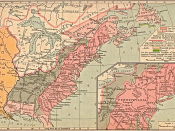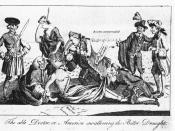Abstract
The mistreatment of our fellow humans is nothing new. Throughout history the fear of the unknown and fear of what is different has caused cultures to treat each other in substandard ways. Only through education can we hope to celebrate the differences among us.
Tell how African slaves came to the New World and their likely living conditions upon arrival.
John Barbot, an agent for the French Royal African Company, made at least two voyages to the West Coast of Africa, in 1678 and 1682 (Mintz, Stephen, 2002). Barbot recounts that "those blacks" were sold as prisoners of war by their own countrymen (Barbot, 1732). Barbot was also amazed that families sold their own children (Barbot, 1732). In fact any West African could be enslaved regardless of their standing. Ayuba Suleiman Diallo, a well to do Muslim of royal lineage, was kidnapped and sold into slavery in 1730 (Bluett, 1734).
The conditions on the ship were by any standards cruel and inhuman. Slaves were crammed into every available space, shackled, lying side by side with little or no room for movement. Since none of the slaves on the ship spoke English, they had no idea what was happening to them. Often they believed that the white man was going to eat them. Disease was rampant and they frequently became ill. Many died on the voyage and many longed for death to relieve them (Olaudah Equiano, 1789).
Once the slaves reached America, conditions were not much better. Slaves were considered chattel and treated no better than animals (Diethorn, 1986). Slaves rarely escaped or purchased their freedom. One of the lucky ones was Josiah Henson. Josiah Henson spent thirty years on a plantation in Montgomery County, Maryland before he escaped slavery and became a Methodist preacher, abolitionist, lecturer, and founder of...


